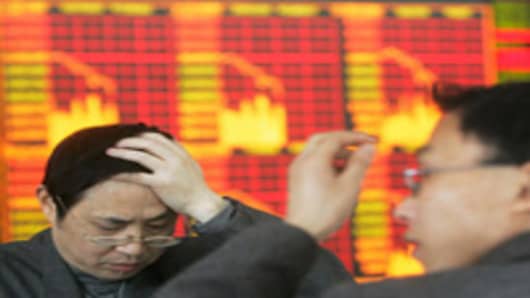It feels like 1997 all over again in Asia. Japan down 10 percent, Hong Kong down 8 percent and Australia down 8 percent as markets around the world are gripped by recession fears. And the selling continued this grim Friday session.
The bloodbath in Asia follows Wall Street's 7 percent plunge Thursday, finishing below the key 9,000 level for its seventh straight day of losses, as coordinated interest rate cuts by the world's leading central banks did little to thaw the credit freeze and lift confidence in the financial sector.
Investors also have doubts that a meeting of the Group of Seven rich nations later Friday can achieve much, with fears growing that the global economy is shifting towards recession.
The yen jumped to a three-year high against the euro and gained 3 percent against the battered Australian dollar as investors panicked about the sell-off in global stocks despite the array of official efforts to unfreeze credit markets.
The euro slid to a low of 133.60 yen before trimming losses to 134.32 yen in hectic and volatile trade, down about 1 percent from late U.S. trade. The dollar hit a six-month low of 98.50 yen, while the Australian dollar shed more than 3 percent to a low of 65.93 yen. Crude oil prices fell $4 to trade below $83 a barrel -- its lowest level in a year on fears of demand destruction.
Government bond futures soared as the rapid decline in Asia stocks forced investors to buy the nearest safe haven despite fears of a supply glut that have recently weighed on U.S. Treasuries. The 10-year Japanese government bond future was up 0.4 point to 138.89, and the 10-year U.S. Treasury note futures were up more than a full point.
Japan'sNikkei 225 Averagedived 9.6 percent -- 881 points --its biggest one-day loss since the 1987 stock market crash, on growing fear the financial crisis will spark a global recession. The benchmark's drop of 24 percent for the week was more than double the weekly drop right after the 1987 market crash. Year-to-date, the Nikkei is down 45.9 percent. The market mood, which was bleak after a fall in New York shares and news that a Japanese real estate investment trust had failed, turned even darker after a bankruptcy filing by unlisted Yamato Life Insurance. At one point, the Nikkei lost more than 1,000 points. The broader Topix lost 7.1 percent to 840.86 after earlier falling more than 8 percent.
Seoul shares closed 4.13 percent down but more than halved an earlier 9 percent fall, after heads of South Korean brokerages met to propose market stabilization funds, and as the won currency rebounded. However the KOSPI still posted a 12.6 percent losses on the week, the
biggest weekly loss since September, 2001 when markets tumbled after attacks on the United States. Year-to-date, the KOSPI is down 34.6 percent. At Friday's low the KOSPI was down 38 percent on the year, and down 16 percent on the week.
Australian shares tumbled 8 percent, the biggest one-day slide since the 1987 stock market crash, as fears of global recession sparked panic selling. Shares slid across the board, with heavyweight lenders and mining stocks all coming under heavy attack. The S&P/ASX 200 fell 360.2 points to close at 3,960.7, the first close below 4,000 since May 2005. Year-to-date, the index is down 37.5 percent. National Australia Bank ended down 12 percent, ANZ down 8 percent and Commonwealth Bank of Australia fell 6.7 percent. Year
Hong Kong shares sank 7.2 percent to a nearly three-year low, after a steep drop on Wall Street set off a new wave of selling by investors worried about the risks of a global recession. The Hang Seng Index chalked up its worst week since the market meltdown of 1997, having relinquished more than 17.5 percent at the day's low. Asia's largest oil & gas producer, PetroChina dropped 5.8 percent while offshore oil specialist CNOOC tumbled 9.2 percent. Financial stocks were among the biggest losers, with Europe's top bank, HSBC Holdings, slumping 6.9 percent. China's biggest lender, ICBC, lost 7.4 percent while smaller rival China Construction Bank gave up 7.6 percent.
Singapore's Straits Times Index plummeted over 7 percent with banks taking the brunt of the beating. DBS Group down 8.7 percent and Singapore Exchange down 3.6 percent. This after Singapore's central bank eased monetary policy for the first time since 2003, in a widely expected move that will slow the rise of the currency to support the export-driven economy, which fell into its first recession since 2002. The economy shrank at an annualized, seasonally adjusted rate of 6.3 percent in the third quarter, after shrinking an annual 5.7 percent in the previous quarter.
The Chinese stock market fell sharply because of the crash of global share prices, but China outperformed the rest of Asia as banking stocks came well off early lows on hopes for government intervention. The Shanghai Composite Index was off by just 3.6 percent.



